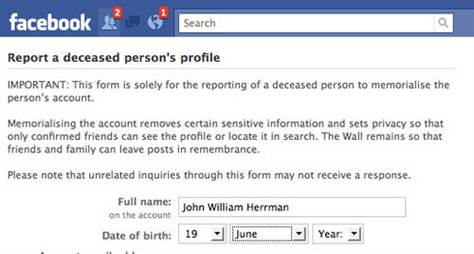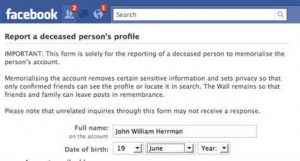
 Michelle Behr, Staff Writer
Michelle Behr, Staff Writer
More than one billion people are currently active on Facebook according to Facebook Newsroom. Considering how many people die every year or on any given day, there is a substantial amount of deceased people who still have a Facebook account. According to an article written by Matt Hunter on CNBC’s website, “the living/dead ratio [of people on Facebook] could be passed as early as the 2060s.”
Here are the fates one’s Facebook account could encounter.
In February of 2015, Facebook enacted the legacy contract. By going to the settings, clicking on security, then scrolling to the bottom, you will see information about the legacy contract. This contract offers the option to have Facebook delete an account after the account holder passes away.
The legacy contract also has the option to pick one person to manage the Facebook account after the original account holder’s death. Once Facebook has been notified of your death, the person you choose will be notified from Facebook. This person will then be able to post one pinned notice informing the deceased’s friends about the death, a possible memorial service, etc. They will also be able to deny or accept friend requests on the person’s behalf and change their profile and cover photos. The person’s page will have the words “remembering” on it and will be turned into a memorial page.
According to Facebook Newsroom, even if one does fill out the legacy contract, until someone notifies Facebook of their passing nothing will happen to their account. It will stay exactly as is except that it will be inactive.
Someone can notify Facebook of a death by filling out the “special request for deceased person’s account” form on Facebook’s help site. Questions include information about the person and proof that they have passed.
If Facebook is notified of someone’s passing but the deceased person did not check the deactivated box in the legacy contract, the person that told Facebook about the passing has the option of asking Facebook to delete the account. The other option is to make the account into a memorial page. To do this, the person who notified Facebook about the death will have to fill out a “memorialization request.” The only difference this time is that nothing can be changed about the account.
TIME.com writer Lia Zneimer published an article in 2014 titled, “How We Mourn in the Age of Social Media.” She describes how a local 24-year-old boy had passed away recently in her hometown and she explained that within a few hours “there was a virtual memorial on his Facebook wall: Friends telling him how much they loved him and would miss him; grade-school classmates recounting funny stories from childhood; college friends expressing their sympathy and sending prayers to his family.” This shows how social media has become a new way to mourn and connect with others that are going through similar heartache.
Up until recently when people wrote their will, they would write who they want the house to go to, or who gets the boat, etc. Now social media accounts are getting divvied up like the family estate. However, this recent development seems to be a large step forward in regards to how to deal with the deceased in the digital world.
Leave a Reply